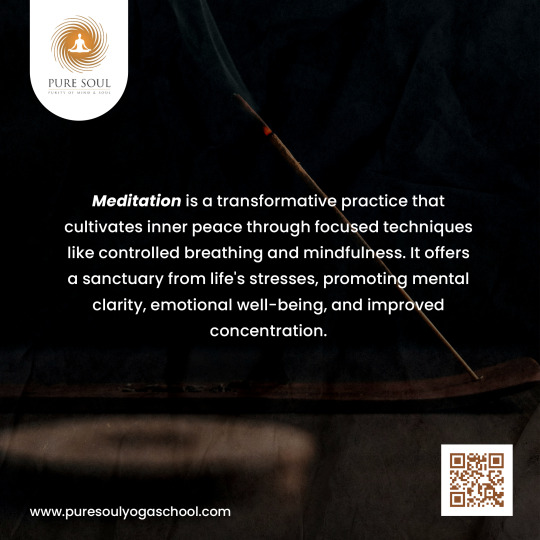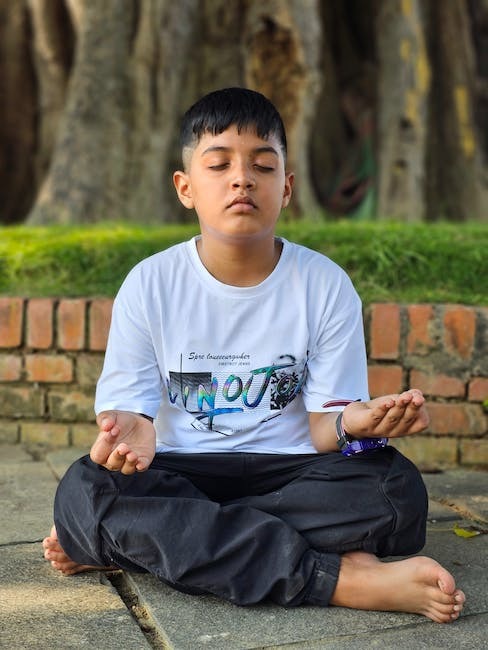#MeditationBenefIts
Text
The social benefits of meditation extend beyond personal well-being, positively impacting relationships and communities. It enhances emotional intelligence, empathy, and compassion, fostering better communication and reducing stress in social interactions. Among the key social benefits of meditation are increased patience, tolerance, improved group dynamics, and peaceful conflict resolution. Meditation also encourages altruistic behavior, strengthens community bonds, and spreads positivity through emotional contagion. By incorporating meditation into daily life, individuals can experience these social benefits of meditation, leading to deeper connections and a more compassionate, harmonious society.
#MeditationBenefits#SocialBenefitsOfMeditation#MindfulnessMatters#EmpathyThroughMeditation#CompassionateLiving#MindfulConnections#MeditationForCommunity#EmotionalIntelligence#PeacefulLiving#PositiveVibes
0 notes
Text
Scientific Insights into Reiki Meditation : The Healing Connection | Inner Wisdom Light

In recent years, the worlds of science and holistic healing have started to intersect more than ever before. One area where this is especially evident is in the comparison of meditation, mindfulness, and Reiki healing. While each of these practices comes from different traditions, scientific studies suggest that they share similar benefits, particularly when it comes to mental and physical well-being. Let’s explore how these practices are connected and what the latest research says about their impact.
Understanding Meditation, Mindfulness, and Reiki
Meditation involves focusing the mind, often through breathing exercises or visualization, to achieve a calm and peaceful state.
Mindfulness refers to the practice of being fully present in the moment, aware of your thoughts, feelings, and surroundings without judgment.
Reiki Healing is a form of energy healing where a practitioner channels universal energy to help heal the body, mind, and spirit.
Scientific Studies and Shared Benefits
Stress Reduction
Meditation and mindfulness have been widely studied for their stress-reducing properties. Research shows that regular practice lowers cortisol levels, the body’s primary stress hormone.
Reiki healing has similar effects, promoting relaxation and reducing anxiety, often within just one session. A study published in the Journal of Alternative and Complementary Medicine found that Reiki significantly reduced stress in hospital patients.
2. Improved Mental Clarity and Focus
Mindfulness meditation enhances focus by training the brain to stay present. It’s been linked to increased gray matter in the brain, which is responsible for processing information and emotions.
In a parallel manner, Reiki helps clear mental blockages, creating a state of mental clarity. During a Reiki session, many people experience a sense of mental calm that helps improve focus and decision-making.
3. Emotional Balance
Mindfulness practices teach individuals how to manage emotions by staying present and observing feelings without reacting. This helps build emotional resilience over time.
Reiki healing can help balance emotions by releasing negative energy, allowing the individual to process emotions with more ease and clarity. People often report feeling emotionally lighter after Reiki sessions.
4. Physical Healing
While meditation and mindfulness are not direct methods of physical healing, they play a role in supporting the body’s immune system by lowering stress and promoting relaxation.
Reiki, however, takes this a step further by channeling healing energy directly to areas of physical pain or discomfort. A study in Cancer Prevention & Control found that Reiki helped reduce pain and fatigue in cancer patients.
5. Energy and Life Force Balance
In meditation, practitioners often focus on breath, which is linked to the flow of energy or prana. Maintaining this flow can help with mental and physical health.
Reiki works directly with the body’s energy systems, or chakras, helping to restore balance and remove blockages. This leads to a harmonious flow of energy, which is believed to aid in healing the body and mind.
How Inner Wisdom Light Can Help?
At Inner Wisdom Light, we believe in the integration of ancient wisdom and modern science to help individuals on their healing journey. Whether you’re seeking mindfulness tools to cultivate inner peace or Reiki healing to balance your energy, we offer a range of services to suit your needs. Our Reiki sessions, guided meditations, and mindfulness coaching can help you experience the full range of benefits discussed above.
We Provide-
Personalized Reiki Sessions: We tailor each session to your unique energy needs, helping you restore balance and harmony in your life.
Meditation & Mindfulness Classes: Our expert guides offer both in-person and online classes to help you develop a regular mindfulness practice.
Holistic Healing Approach: We integrate Reiki, meditation, and mindfulness into a comprehensive healing approach, ensuring that you receive support on all levels — physical, emotional, and spiritual.
Continue your journey by visiting our website for further insights!
#ReikiHealing #Mindfulness #MeditationBenefits #EnergyHealing #MindBodyConnection #StressRelief #HealingScience #InnerWisdomLight #ChakraHealing #HolisticHealth
#ReikiHealing#Mindfulness#MeditationBenefits#EnergyHealing#MindBodyConnection#StressRelief#HealingScience#InnerWisdomLight#ChakraHealing#HolisticHealth
1 note
·
View note
Photo

Zen Meditation (Zazen): A Path to Inner Peace and Mindfulness https://rntozen.com/blog/meditate/zen-meditation-zazen-a-path-to-inner-peace-and-mindfulness/?utm_source=tumblr&utm_medium=RN+To+Zen+Social+Media&utm_campaign=RN+To+Zen+Posts
#BuddhistMeditation#InnerPeace#MeditationBenefits#MentalClarity#Mindfulness#SatoriJourney#SpiritualAwareness#ZazenPractice#ZenBuddhism#ZenMeditation
0 notes
Text
🌿 Find Your Inner Peace with Meditation 🌿
At Omkar Aham Yoga Mandiram, we believe in the transformative power of meditation. Taking just a few moments each day to meditate can bring profound benefits to your mind, body, and spirit.
Join us and experience the calming and healing effects of meditation.
📞WhatsApp/Call: +91-9997744876
📧Mail us at: [email protected]
#MeditationBenefits#Mindfulness#InnerPeace#YogaLife#WellnessJourney#MentalHealth#YogaCommunity#OmkarAhamYogaMandiram
0 notes
Text
🧘♀️ The Life-Changing Effects of Meditation: 11 Positive Changes That Enhance Your Life 🧘♂️
Hey Tumblr fam! Are you ready to discover the transformative power of meditation? This ancient practice does more than just calm the mind; it enhances your entire life. From improving focus to boosting creativity, meditation offers countless benefits. Dive into our latest blog post and see how easy it is to incorporate meditation into your daily routine!

✨ What You’ll learn:
Improved focus and clarity
Stress reduction and management
Better sleep quality
Enhanced creativity
Increased emotional well-being
Boosted immune system
Spiritual growth
🔗 [Read the full article here]
Why meditate? 🧘♀️ It helps reduce stress and manage emotions 🧘♂️ Enhances focus and cognitive functions 🧘♀️ Promotes better sleep and overall well-being
Ready to start your meditation journey? Click the link above to dive into the full guide and start reaping the benefits today!
Share your thoughts: Have you experienced the benefits of meditation? How do you incorporate it into your routine? Let’s chat about how meditation has improved your life!
Thanks for visiting our blog! For more wellness tips and insights, stay tuned. If you enjoyed this post, please reblog, like, and consider supporting us through our blog link. Your support helps us continue sharing awesome content!
#Meditation#Mindfulness#StressReduction#MentalHealth#EmotionalWellbeing#SpiritualGrowth#Focus#Clarity#BetterSleep#AnxietyRelief#DepressionManagement#BrainHealth#CognitiveFunction#SelfDiscovery#InnerPeace#Relaxation#MindBodyConnection#Wellness#PersonalTransformation#MeditationBenefits#StressManagement#HealthyLifestyle#HolisticHealth#PositiveThinking#SelfAwareness#Compassion#Empathy#CreativityBoost#ImmuneSystem#EmotionalIntelligence
1 note
·
View note
Text
🧘♀️ The Life-Changing Effects of Meditation: 11 Positive Changes That Enhance Your Life 🧘♂️
Hey Tumblr fam! Are you ready to discover the transformative power of meditation? This ancient practice does more than just calm the mind; it enhances your entire life. From improving focus to boosting creativity, meditation offers countless benefits. Dive into our latest blog post and see how easy it is to incorporate meditation into your daily routine!

✨ What You’ll learn:
Improved focus and clarity
Stress reduction and management
Better sleep quality
Enhanced creativity
Increased emotional well-being
Boosted immune system
Spiritual growth
🔗 [Read the full article here]
Why meditate? 🧘♀️ It helps reduce stress and manage emotions 🧘♂️ Enhances focus and cognitive functions 🧘♀️ Promotes better sleep and overall well-being
Ready to start your meditation journey? Click the link above to dive into the full guide and start reaping the benefits today!
Share your thoughts: Have you experienced the benefits of meditation? How do you incorporate it into your routine? Let’s chat about how meditation has improved your life!
Thanks for visiting our blog! For more wellness tips and insights, stay tuned. If you enjoyed this post, please reblog, like, and consider supporting us through our blog link. Your support helps us continue sharing awesome content!
#Meditation#Mindfulness#StressReduction#MentalHealth#EmotionalWellbeing#SpiritualGrowth#Focus#Clarity#BetterSleep#AnxietyRelief#DepressionManagement#BrainHealth#CognitiveFunction#SelfDiscovery#InnerPeace#Relaxation#MindBodyConnection#Wellness#PersonalTransformation#MeditationBenefits#StressManagement#HealthyLifestyle#HolisticHealth#PositiveThinking#SelfAwareness#Compassion#Empathy#CreativityBoost#ImmuneSystem#EmotionalIntelligence
1 note
·
View note
Text
Different Meditation Traditions and Styles
Meditation has always made turning points in people’s lives. However, what comes to people’s minds when they hear this is the traditional seated position. But did you know that there are different meditation traditions and styles? Learn the surprising facts in this article.
#meditation#MeditationJourney#meditationbenefits#yoga#meditationmusic#yogapractice#yogainspiration#yogacommunity
0 notes
Photo

Transform Your Care Business: From Dream to Reality
In the care industry, the journey from ambition to success is challenging. Despite impressive revenue, the harsh reality often includes sleepless nights and overwhelming stress.
The Illusion of Success
On paper, everything looks great. In reality, thin margins and endless regulations paint a different picture. Staff might think you're fortunate, but they don't see the pressure and constant worry.
Working Smarter, Not Harder
It’s time to reclaim your life and rebuild your business:
Delegate to the Team: Empower your team to take on more.
Hire a Virtual Assistant: Outsource administrative tasks.
Seek Higher-Paid Contracts: Value your services.
Prioritize Rest: Adequate sleep is crucial.
Meditate: Reduce stress and enhance clarity.
Exercise: Boost mood and productivity.
Collaborate: Network with like-minded professionals.
Take the Next Step
Ready to increase your profit margin by up to 50%? Book a free consultation for a comprehensive business audit.
Join Us
Transform your business and life. Register now for our three-day training event!
Register Now
Connect with Us: YouTube Channel
Facebook Community
#CareBusinessSuccess#HealthcareLeadership#FinancialFreedom#WorkSmarterNotHarder#BusinessTransformation#CareProviderJourney#DelegateToSuccess#VirtualAssistant#AlphaVirtualAssistant#CareHome#HigherPaidContracts#RestForSuccess#MeditationBenefits#ExerciseForProductivity#HealthcareCollaboration
0 notes
Text
Discover the many benefits of meditation and how it can improve your mental and physical health. Learn why meditation is beneficial for stress relief, mental clarity, and overall well-being.
#meditationbenefits#stressreliefmeditation#mindfulnesspractice#meditationtechniques#mentalhealthmeditation
0 notes
Text
Mind-Body Connection: How Spirituality Can Enhance Physical and Emotional Well-being

In the vast tapestry of human existence, the mind and body are often viewed as separate entities. However, the profound interconnectedness of these dimensions reveals that true well-being is achieved when they are harmoniously aligned. Spirituality, an ancient and timeless pursuit, offers a unique pathway to bridge this connection, fostering both physical and emotional well-being.
The Essence of Spirituality
Spirituality transcends the confines of religion, delving into the core of our being and our relationship with the universe. It is a personal journey of self-discovery, meaning, and purpose. At its heart, spirituality is about connecting with something greater than oneself, whether it's a higher power, the universe, or the essence of life itself. This connection fosters a sense of inner peace, purpose, and fulfillment that permeates every aspect of our lives.
Physical Well-being Through Spiritual Practices
Meditation and Mindfulness: The practice of meditation and mindfulness has profound effects on physical health. By calming the mind and focusing on the present moment, these practices reduce stress, lower blood pressure, and improve immune function. The deep state of relaxation achieved during meditation allows the body to heal and regenerate, promoting overall physical health.
Yoga and Movement: Yoga, an ancient spiritual practice, integrates physical postures, breath control, and meditation. It enhances flexibility, strength, and balance, while also fostering a deep sense of inner calm. The physical benefits of yoga are well-documented, including improved cardiovascular health, reduced inflammation, and enhanced respiratory function.
Healing Energy Practices: Practices such as Reiki and Qi Gong tap into the body's energy systems, promoting physical healing and balance. These practices work on the principle that energy flows through the body, and any blockage can lead to physical ailments. By restoring the natural flow of energy, these spiritual practices support the body's ability to heal itself.
Emotional Well-being Through Spiritual Practices
Gratitude and Compassion: Embracing gratitude and compassion as daily spiritual practices transforms our emotional landscape. By focusing on the positive aspects of life and extending kindness to others, we cultivate a sense of happiness and contentment. These practices reduce feelings of anxiety and depression, fostering emotional resilience and well-being.
Prayer and Reflection: Prayer, whether traditional or personal, offers a profound sense of connection and comfort. It provides an opportunity to express hopes, fears, and gratitude, fostering emotional release and clarity. Reflecting on one's life journey through journaling or quiet contemplation also nurtures emotional health by providing insight and perspective.
Community and Connection: Engaging in spiritual communities provides a support network that enhances emotional well-being. Sharing experiences, offering support, and celebrating together create a sense of belonging and purpose. These connections alleviate feelings of loneliness and isolation, fostering a sense of emotional security and happiness.
A Unique Perspective on Spirituality and Well-being
In a world that often prioritizes the physical over the spiritual, understanding the mind-body connection through spirituality offers a divergent and unparalleled perspective. This approach recognizes that true well-being is not merely the absence of illness but a harmonious balance of mind, body, and spirit. Spirituality provides the tools to navigate this journey, offering a holistic approach to health that is both profound and transformative.
Practical Toolkit for Incorporating Spirituality into Daily Routine
To integrate spirituality into daily life and enhance physical and emotional well-being, consider the following practical toolkit:
Daily Meditation Practice:
Time: Set aside 10-15 minutes each morning or evening.
Technique: Sit in a comfortable position, close your eyes, and focus on your breath. Let thoughts come and go without attachment.
Benefits: Reduces stress, enhances mental clarity, and promotes inner peace.
Mindful Movement:
Yoga: Practice a 20-30 minute yoga routine, focusing on breath and movement.
Walking Meditation: Walk slowly and mindfully, paying attention to each step and your surroundings.
Benefits: Improves physical health, enhances mindfulness, and reduces stress.
Gratitude Journaling:
Time: Spend 5-10 minutes each day writing down three things you are grateful for.
Approach: Reflect on both big and small blessings in your life.
Benefits: Boosts emotional well-being, fosters positive outlook, and reduces anxiety.
Compassion Practice:
Loving-Kindness Meditation: Spend a few minutes each day sending loving thoughts to yourself and others.
Acts of Kindness: Perform small acts of kindness daily, such as complimenting someone or helping a stranger.
Benefits: Enhances emotional resilience, reduces feelings of loneliness, and fosters connection.
Spiritual Reading and Reflection:
Daily Reading: Read a few pages from spiritual texts or inspirational books.
Reflection: Spend a few minutes reflecting on the readings and how they apply to your life.
Benefits: Provides insight, fosters spiritual growth, and enhances emotional clarity.
Energy Healing Practices:
Reiki: If possible, receive regular Reiki sessions or learn basic self-Reiki techniques.
Qi Gong: Practice Qi Gong exercises to enhance energy flow and promote physical health.
Benefits: Supports physical healing, reduces stress, and enhances energy levels.
Community Involvement:
Spiritual Groups: Join a local spiritual group or community that aligns with your beliefs.
Volunteering: Engage in volunteer activities that resonate with your spiritual values.
Benefits: Provides support, fosters a sense of belonging, and enhances emotional well-being.
Prayer and Affirmations:
Daily Prayer: Set aside time each day for prayer or affirmations.
Affirmations: Create and repeat positive affirmations that resonate with your spiritual beliefs.
Benefits: Enhances emotional resilience, fosters a sense of connection, and promotes inner peace.
Looking Ahead
The mind-body connection, when nurtured through spirituality, reveals a profound pathway to holistic well-being. By embracing spiritual practices, we can enhance our physical health, emotional resilience, and overall sense of fulfillment. This unique perspective on well-being encourages us to look beyond the surface, delving deep into the essence of our being to achieve true harmony and balance. Incorporating these practices into our daily routine not only transforms our own lives but also radiates positive energy to those around us, fostering a world of compassion, peace, and interconnectedness.
#MindBodyConnection#SpiritualWellBeing#HolisticHealth#InnerPeace#MeditationBenefits#YogaLifestyle#GratitudePractice#EnergyHealing#EmotionalResilience#MentalClarity#SpiritualJourney#HealthyLiving#StressRelief#CommunityWellness#PositiveEnergy#AGImageAI
0 notes
Text
The TM technique is a simple, effortless meditation practice that allows the mind to reach a state of restful awareness through the use of a personal mantra. Rooted in ancient Vedic traditions and popularized by Maharishi Mahesh Yogi, TM offers numerous scientifically backed benefits, including reduced stress, improved emotional stability, enhanced cognitive function, and better heart health. It is easy to learn, requires no special postures, and is accessible to people of all backgrounds. Practicing TM regularly can lead to greater mental clarity, emotional resilience, and overall well-being.
#TranscendentalMeditation#TMTechnique#MeditationBenefits#StressRelief#Mindfulness#MentalWellness#EmotionalBalance#HealthyLiving#InnerPeace#PersonalGrowth#Wellbeing#MeditationPractice#MindBodyConnection#ReduceStress#HolisticHealth
1 note
·
View note
Photo

Positive Benefits of Daily Meditation: Let’s Take A Look! https://rntozen.com/blog/meditate/positive-benefits-of-daily-meditation/?utm_source=tumblr&utm_medium=RN+To+Zen+Social+Media&utm_campaign=RN+To+Zen+Posts
0 notes
Text

Ready to strengthen your connection with your children? Explore the transformative power of shared meditation in our latest blog post. Join us on the journey of mindful parenting and discover the benefits of practicing together.
https://www.buui.co/post/mindfulness-meditation-meditating-with-your-children
0 notes
Text


𝐍𝐚𝐦𝐚𝐬𝐭𝐞🙏
Immerse yourself in the sacred practice of 𝐌𝐞𝐝𝐢𝐭𝐚𝐭𝐢𝐨𝐧 at 𝐏𝐮𝐫𝐞 𝐒𝐨𝐮𝐥 𝐘𝐨𝐠𝐚 𝐒𝐜𝐡𝐨𝐨𝐥. Let the 𝐈𝐧𝐧𝐞𝐫 𝐜𝐚𝐥𝐦 and 𝐎𝐮𝐭𝐞𝐫 𝐬𝐭𝐢𝐥𝐥𝐧𝐞𝐬𝐬 guide you to a place of profound peace. 🧘♂️🕉️
𝗘𝗻𝗿𝗼𝗹𝗹 𝗻𝗼𝘄 𝗳𝗼𝗿 𝗼𝘂𝗿 𝗬𝗼𝗴𝗮 𝗧𝗧𝗖 𝗮𝘁 𝗣𝘂𝗿𝗲 𝗦𝗼𝘂𝗹!
➡️𝗪𝗲𝗯𝘀𝗶𝘁𝗲: https://puresoulyogaschool.com/
➡️𝗖𝗮𝗹𝗹/𝗪𝗵𝗮𝘁𝘀𝗔𝗽𝗽: +91-9410771660
➡️𝗘-𝗺𝗮𝗶𝗹: info@puresoulyoga
#meditation#puresoulyogaschool#yogaméditation#rishikeshyoga#yogasana#meditationpractice#meditationtime#meditationspace#meditationinstructor#yogaforall#yogadaily#yogahealing#yogainstructor#yogabenefits#meditationbenefits#relax#awareness#attention#meditationteachertraining#yogateachertrainingcourse#yogateachers
0 notes
Text

𝐃𝐨 𝐘𝐨𝐮 𝐊𝐧𝐨𝐰 𝐀𝐛𝐨𝐮𝐭 𝐓𝐡𝐞 𝐁𝐞𝐧𝐞𝐟𝐢𝐭𝐬 𝐎𝐟 𝐌𝐞𝐝𝐢𝐭𝐚𝐭𝐢𝐨𝐧 𝐓𝐡𝐞𝐫𝐚𝐩𝐲
𝟏. Improve Sleep 💤
𝟐. Emotional Stability 🌈
𝟑. Manages Depression 🌼
𝟒. Relaxes The Mind 🧘♂️
𝟓.Better Concentration 🎯
𝟔. Reduces Stress 🌬️
...
𝐂𝐨𝐧𝐭𝐚𝐜𝐭 𝐔𝐬 𝐍𝐨𝐰: 𝟖𝟐𝟖𝟕𝟒𝟒𝟓𝟖𝟎𝟖📞
𝐕𝐢𝐬𝐢𝐭 𝐮𝐬 𝐚𝐭 www.sppc.in
𝐥𝐨𝐜𝐚𝐭𝐢𝐨𝐧:- Shanti Marg, Narwana Rd, near Manglam Red Light, Block E West Vinod Nagar, New Delhi, Delhi 110092
#SPPC#sppc#patanjali#ayurveda#hospital#MeditationBenefits#WellnessJourney#Mindfulness#EmotionalHealth#StressRelief#SleepBetter#Concentration#MentalWellbeing#InnerPeace#SelfCareTips
0 notes
Text
What Does Meditation Do?

Meditation is a practice that has been around for thousands of years, and its benefits are widely recognized. But what exactly does meditation do? How does it affect our bodies, our minds, and our overall health? In this blog post, we will explore the science behind meditation, its benefits, and how you can incorporate it into your daily life.
Introduction to Meditation
Definition of Meditation
Meditation is a practice where an individual uses a technique – such as mindfulness, or focusing the mind on a particular object, thought, or activity – to train attention and awareness, and achieve a mentally clear and emotionally calm and stable state. It's a way to connect with your inner self and achieve a sense of peace and balance.
Brief History of Meditation Practices
Meditation practices date back thousands of years. They were initially meant to deepen understanding of the sacred and mystical forces of life. Over time, they evolved into a range of practices aimed at promoting relaxation, stress reduction, and the development of compassion, love, patience, generosity, and forgiveness. Today, meditation is commonly used for relaxation and stress reduction.

Photo by Avery Arwood on Pexels
Health Benefits of Meditation
Reduction of Stress
One of the primary reasons people turn to meditation is stress reduction. Meditation can produce a deep state of relaxation and a tranquil mind, which can help reduce stress levels.
Lowering cortisol levels
Meditation has been shown to reduce levels of the stress hormone cortisol. High cortisol levels can lead to harmful effects on the body, including inflammation, insomnia, and depression. By reducing cortisol levels, meditation can help to alleviate these conditions.
Improving stress-related conditions
Stress can exacerbate many health conditions, including heart disease, diabetes, and mental health disorders. Meditation can help manage these conditions by reducing the body's stress response.
Control of Anxiety
Regular meditation can also help reduce symptoms of anxiety disorders, including panic attacks, social anxiety, obsessive-compulsive disorder, and phobias. It can also help you to develop coping mechanisms to manage your anxiety.
Decreasing symptoms of anxiety disorders
By focusing on the present moment and not allowing the mind to dwell on the unchangeable past or undetermined future, meditation can help reduce symptoms of anxiety.
Enhancing resilience to stress
Meditation can also increase your resilience to stress, making you less likely to be affected by anxiety-provoking situations.
Promotion of Emotional Health
Meditation can lead to an improved self-image and a more positive outlook on life, which can greatly enhance your emotional health.
Elevating mood
By reducing stress and anxiety, meditation can improve your mood and overall disposition. Regular meditation can even lead to an increase in happiness.
Reducing symptoms of depression
By generating a state of relaxation, meditation can help reduce symptoms of depression, such as feelings of hopelessness and sadness.
Improvement of Physical Well-being
Meditation can also have numerous benefits for your physical health, including lowering blood pressure and supporting immune system function.
Lowering blood pressure
Meditation can lead to physical changes in the body that can help lower blood pressure. This can reduce the strain on your heart and arteries, helping prevent heart disease.
Supporting immune system function
By reducing stress and promoting relaxation, meditation can boost your immune system, making you more resistant to diseases and illnesses.

Photo by CP Khanal on Pexels
Cognitive and Psychological Effects
Enhancing Self-awareness
Meditation can help you develop a stronger understanding of yourself, helping you grow into your best self. It can also increase your mindfulness, which can help you stay focused on the present and not get caught up in negative thought patterns.
Building a stronger understanding of self
Through meditation, you can gain a better understanding of your own identity and your place in the world. This can lead to greater self-confidence and a more positive outlook on life.
Increasing mindfulness
Mindfulness is a state of being fully present and engaged in the current moment. Meditation can help increase your mindfulness, leading to improvements in all areas of your life.
Lengthening Attention Span
Meditation can also help improve your attention span and focus. It can help you stay focused on tasks for longer periods and improve your performance in a variety of tasks.
Improving concentration
One of the main benefits of meditation is improved concentration. By training your mind to focus on one thing at a time, you can improve your ability to concentrate.
Reducing mind-wandering
Mind-wandering can be a major source of stress and anxiety. Meditation can help reduce mind-wandering and keep your mind focused on the present.
Potential to Change the Brain
Research has shown that meditation can actually change the structure of the brain, leading to improvements in memory, sense of self, and empathy.
Neuroplasticity and meditation
Neuroplasticity is the brain's ability to change and adapt as a result of experience. Meditation can promote neuroplasticity, leading to improvements in brain function and mental health.
Changes in brain regions associated with memory, sense of self, and empathy
Studies have shown that meditation can lead to changes in brain regions associated with memory, sense of self, and empathy. This can lead to improvements in these areas, enhancing your overall quality of life.

Photo by SuGuna Photos on Pexels
Meditation Techniques and Practices
Types of Meditation
There are many different types of meditation, each with its own focus and techniques. Some of the most common types include mindfulness meditation, concentration meditation, and loving-kindness meditation.
Mindfulness meditation
Mindfulness meditation involves focusing on your breath and bringing your mind's attention to the present without drifting into concerns about the past or future.
Concentration meditation
Concentration meditation involves focusing on a single point. This could involve following the breath, repeating a single word or mantra, staring at a candle flame, listening to a repetitive gong, or counting beads on a mala.
Loving-kindness meditation
Loving-kindness meditation is a method of developing compassion. It involves mentally sending goodwill, kindness, and warmth toward others by silently repeating a series of mantras.
Elements of Meditation
Regardless of the type of meditation you choose, the practice involves the same basic elements.
Focused attention
Focusing your attention is generally one of the most important elements of meditation. Focusing your attention is what helps free your mind from the many distractions that cause stress and worry. You can focus your attention on such things as a specific object, an image, a mantra, or even your breathing.
Relaxed breathing
This technique involves deep, even-paced breathing using the diaphragm muscle to expand your lungs. The purpose is to slow your breathing, take in more oxygen, and reduce the use of shoulder, neck, and upper chest muscles while breathing so you breathe more efficiently.
A quiet setting
If you're a beginner, practicing meditation may be easier if you're in a quiet spot with few distractions, including no television, radios, or cellphones.
A comfortable position
You can practice meditation whether you're sitting, lying down, walking, or in other positions or activities. Just try to be comfortable so that you can get the most out of your meditation practice.
Open attitude
Let thoughts pass through your mind without judgment. Don't dwell on the past or anticipate the future; just focus on the present.

Photo by Avery Arwood on Pexels
Incorporating Meditation into Daily Life
Starting a Meditation Practice
Starting a meditation practice doesn't have to be overwhelming or require a special location or equipment. Here are some tips to get you started.
Finding time for meditation
You can meditate at any time of the day that works for you. However, many people find that meditating in the morning helps them start their day with a sense of calm and focus.
Creating a conducive environment
Find a quiet, comfortable space where you won't be disturbed. This could be a dedicated room in your home, or even a quiet spot in your garden or local park.
Building Meditation Skills
Like any skill, meditation requires practice to achieve satisfying results. Here are some tips to help you build your meditation skills.
Gradually increasing duration
Start with just a few minutes of meditation each day, and gradually increase the duration as your skills improve.
Using guided meditation resources
There are many resources available to help you learn to meditate. These include books, apps, and online videos and courses. You can also attend a class or workshop to learn from a skilled instructor.
Everyday Ways to Practice Meditation
You don't have to set aside dedicated time for meditation. There are many ways to incorporate mindfulness into your everyday activities.
Mindful eating
Pay attention to the taste, texture, and aroma of your food. Eat slowly and savor each bite. This can help you enjoy your food more and prevent overeating.
Walking meditation
Focus on each step, the sensation of your feet touching the ground, the rhythm of your breath while walking, and the feeling of wind against your face.
Integrating mindfulness into routine activities
Try to bring mindfulness to the activities you do every day, such as washing dishes, brushing your teeth, or commuting to work. This can help you stay present and focused, no matter what you're doing.
In conclusion, meditation is a powerful tool that can help reduce stress, improve mental and physical health, and enhance overall quality of life. By incorporating meditation into your daily routine, you can reap these benefits and more. So why not give it a try?
For more information on meditation and its benefits, check out our other articles on Types of Meditation, The Power of Meditation, and Benefits of Regular Meditation Practice.
And remember, it's never too late to start meditating. So why not start today?
#Meditation Science #Meditation Research #Meditation Benefits #Effective Meditation #Meditation Techniques
Source: Mayo Clinic, Healthline, Harvard Health
Frequently Asked Questions About Meditation
What is meditation?Meditation is a mental practice that involves focusing the mind on a particular object, thought, or activity to train attention and awareness and achieve a mentally clear emotionally calm, and stable state. It has been practiced for thousands of years and is a part of many religious traditions and beliefs, but it can also be done as a secular practice for its well-being benefits.
How does meditation affect the brain?Meditation has been found to produce changes in various areas of the brain. Studies using MRI scans have shown that meditation can increase the gray matter density in parts of the brain related to memory, sense of self, empathy, and stress. It can also alter brainwave patterns, promoting relaxation and potentially enhancing cognitive performance over time.
Can meditation reduce stress?Yes, one of the most well-established benefits of meditation is stress reduction. Regular meditation practice has been shown to decrease the production of stress hormones, such as cortisol, and promote a relaxation response in the body. This can lead to reduced feelings of stress and anxiety, and improve overall well-being.
Is meditation helpful for anxiety and depression?Meditation can be a useful tool for managing symptoms of anxiety and depression. Mindfulness meditation, in particular, helps individuals become more aware of their thoughts and feelings without becoming overwhelmed by them. This can reduce the impact of negative thought patterns and improve mood.
What are the different types of meditation?There are many types of meditation, each with its own unique focus and techniques. Some of the most popular include Mindfulness Meditation, which emphasizes present-moment awareness; Transcendental Meditation, which uses a mantra or repeated phrase; and Loving-Kindness Meditation, which focuses on developing feelings of compassion and love towards oneself and others.
How long should I meditate for?The ideal duration for meditation can vary from person to person. Beginners might start with just a few minutes a day and gradually increase the time as they become more comfortable with the practice. Many experienced practitioners aim for 20-30 minutes per session, but even short periods of meditation can be beneficial.
Do I need a teacher to meditate?While a teacher can provide guidance and help refine your meditation practice, it is not strictly necessary to have one. There are many resources available, such as books, online courses, and apps, that can help you get started and progress in your meditation journey. However, a teacher can offer personalized advice and support, especially when dealing with specific challenges.
Can meditation improve physical health?Meditation has been linked to a variety of physical health benefits. It can help lower blood pressure, reduce chronic pain, improve sleep, and even support the immune system. These benefits are thought to be related to the stress-reducing effects of meditation, as chronic stress can negatively impact physical health.
Is it normal for my mind to wander during meditation?It is completely normal for the mind to wander during meditation. The practice is not about stopping thoughts but rather noticing when your attention has drifted and gently bringing it back to your focus point. With time and practice, you may find that your mind wanders less frequently.
What is the best time of day to meditate?There is no one "best" time to meditate—it largely depends on your personal schedule and preferences. Some people find that meditating first thing in the morning helps set a positive tone for the day, while others prefer to meditate in the evening as a way to unwind. Experiment with different times to see what works best for you.
Read the full article
0 notes